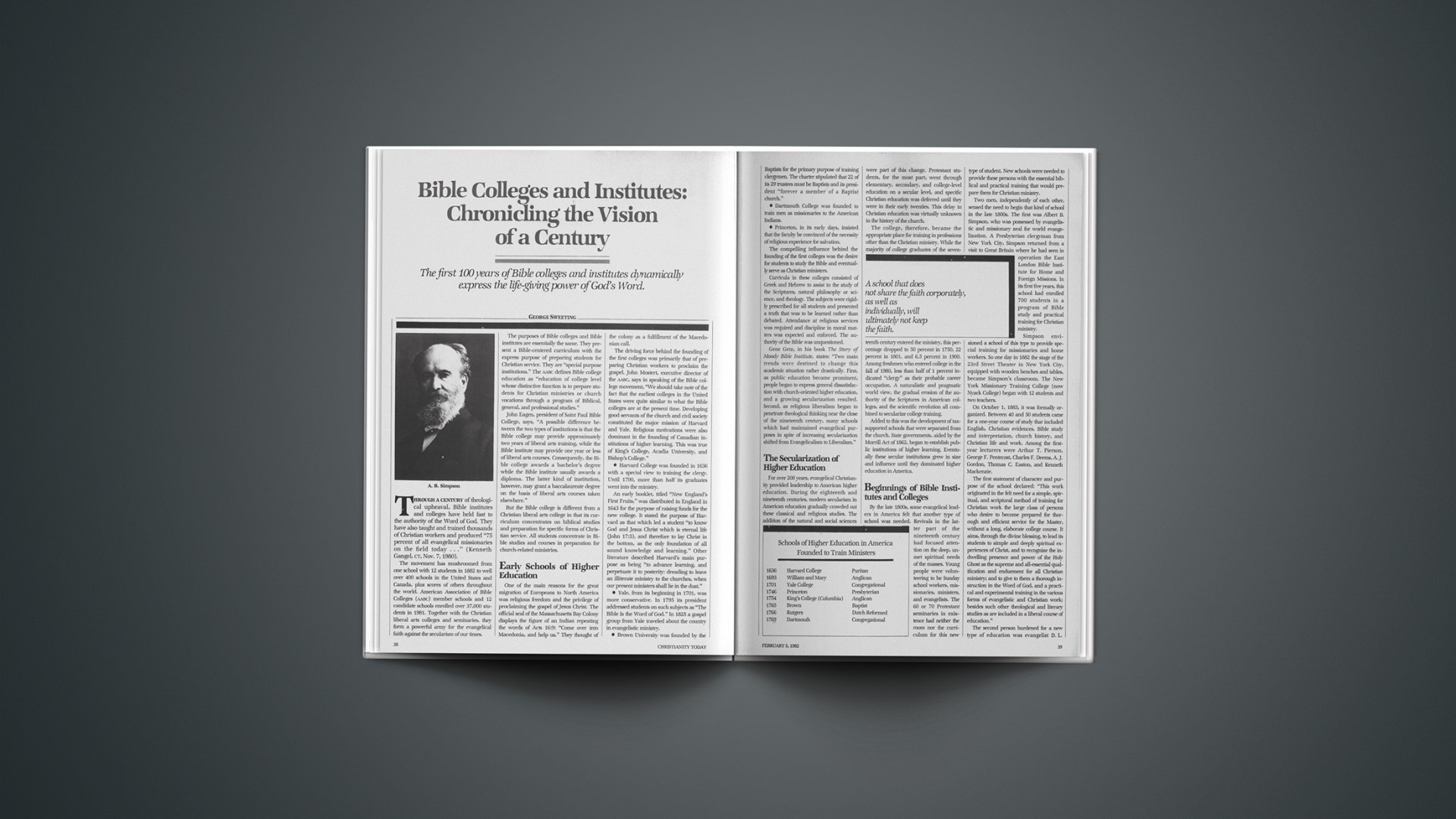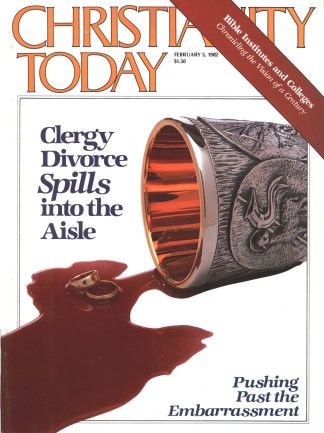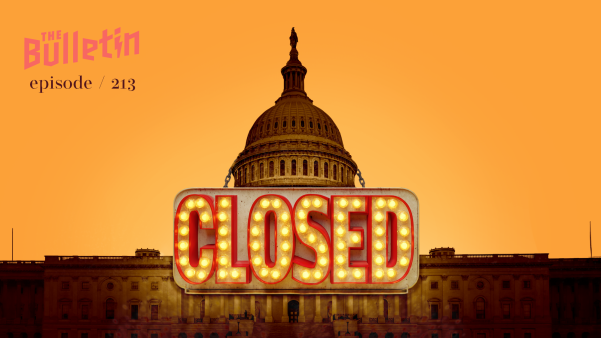Through a century of theological upheaval, Bible institutes and colleges have held fast to the authority of the Word of God. They have also taught and trained thousands of Christian workers and produced “75 percent of all evangelical missionaries on the field today …” (Kenneth Gangel, CT, Nov. 7, 1980).
The movement has mushroomed from one school with 12 students in 1882 to well over 400 schools in the United States and Canada, plus scores of others throughout the world. American Association of Bible Colleges (AABC) member schools and 12 candidate schools enrolled over 37,000 students in 1981. Together with the Christian liberal arts colleges and seminaries, they form a powerful army for the evangelical faith against the secularism of our times.
The purposes of Bible colleges and Bible institutes are essentially the same. They present a Bible-centered curriculum with the express purpose of preparing students for Christian service. They are “special purpose institutions.” The AABC defines Bible college education as “education of college level whose distinctive function is to prepare students for Christian ministries or church vocations through a program of Biblical, general, and professional studies.”
John Eagen, president of Saint Paul Bible College, says, “A possible difference between the two types of institutions is that the Bible college may provide approximately two years of liberal arts training, while the Bible institute may provide one year or less of liberal arts courses. Consequently, the Bible college awards a bachelor’s degree while the Bible institute usually awards a diploma. The latter kind of institution, however, may grant a baccalaureate degree on the basis of liberal arts courses taken elsewhere.”
But the Bible college is different from a Christian liberal arts college in that its curriculum concentrates on biblical studies and preparation for specific forms of Christian service. All students concentrate in Bible studies and courses in preparation for church-related ministries.
Early Schools Of Higher Education
One of the main reasons for the great migration of Europeans to North America was religious freedom and the privilege of proclaiming the gospel of Jesus Christ. The official seal of the Massachusetts Bay Colony displays the figure of an Indian repeating the words of Acts 16:9: “Come over into Macedonia, and help us.” They thought of the colony as a fulfillment of the Macedonian call.
The driving force behind the founding of the first colleges was primarily that of preparing Christian workers to proclaim the gospel. John Mostert, executive director of the AABC, says in speaking of the Bible college movement, “We should take note of the fact that the earliest colleges in the United States were quite similar to what the Bible colleges are at the present time. Developing good servants of the church and civil society constituted the major mission of Harvard and Yale. Religious motivations were also dominant in the founding of Canadian institutions of higher learning. This was true of King’s College, Acadia University, and Bishop’s College.”
• Harvard College was founded in 1636 with a special view to training the clergy. Until 1700, more than half its graduates went into the ministry.
An early booklet, titled “New England’s First Fruits,” was distributed in England in 1643 for the purpose of raising funds for the new college. It stated the purpose of Harvard as that which led a student “to know God and Jesus Christ which is eternal life (John 17:3), and therefore to lay Christ in the bottom, as the only foundation of all sound knowledge and learning.” Other literature described Harvard’s main purpose as being “to advance learning, and perpetuate it to posterity: dreading to leave an illiterate ministry to the churches, when our present ministers shall lie in the dust.”
• Yale, from its beginning in 1701, was more conservative. In 1795 its president addressed students on such subjects as “The Bible Is the Word of God.” In 1825 a gospel group from Yale traveled about the country in evangelistic ministry.
• Brown University was founded by the Baptists for the primary purpose of training clergymen. The charter stipulated that 22 of its 29 trustees must be Baptists and its president “forever a member of a Baptist church.”
• Dartmouth College was founded to train men as missionaries to the American Indians.
• Princeton, in its early days, insisted that the faculty be convinced of the necessity of religious experience for salvation.
The compelling influence behind the founding of the first colleges was the desire for students to study the Bible and eventually serve as Christian ministers.
Curricula in these colleges consisted of Greek and Hebrew to assist in the study of the Scriptures, natural philosophy or science, and theology. The subjects were rigidly prescribed for all students and presented a truth that was to be learned rather than debated. Attendance at religious services was required and discipline in moral matters was expected and enforced. The authority of the Bible was unquestioned.
Gene Getz, in his book The Story of Moody Bible Institute, states: “Two main trends were destined to change this academic situation rather drastically. First, as public education became prominent, people began to express general dissatisfaction with church-oriented higher education, and a growing secularization resulted. Second, as religious liberalism began to penetrate theological thinking near the close of the nineteenth century, many schools which had maintained evangelical purposes in spite of increasing secularization shifted from Evangelicalism to Liberalism.”
The Secularization Of Higher Education
For over 200 years, evangelical Christianity provided leadership to American higher education. During the eighteenth and nineteenth centuries, modern secularism in American education gradually crowded out these classical and religious studies. The addition of the natural and social sciences were part of this change. Protestant students, for the most part, went through elementary, secondary, and college-level education on a secular level, and specific Christian education was deferred until they were in their early twenties. This delay in Christian education was virtually unknown in the history of the church.
The college, therefore, became the appropriate place for training in professions other than the Christian ministry. While the majority of college graduates of the seventeenth century entered the ministry, this percentage dropped to 50 percent in 1750, 22 percent in 1801, and 6.5 percent in 1900. Among freshmen who entered college in the fall of 1980, less than half of 1 percent indicated “clergy” as their probable career occupation. A naturalistic and pragmatic world view, the gradual erosion of the authority of the Scriptures in American colleges, and the scientific revolution all combined to secularize college training.
Added to this was the development of tax-supported schools that were separated from the church. State governments, aided by the Morrill Act of 1862, began to establish public institutions of higher learning. Eventually these secular institutions grew in size and influence until they dominated higher education in America.
Beginnings Of Bible Institutes And Colleges
By the late 1800s, some evangelical leaders in America felt that another type of school was needed. Revivals in the latter part of the nineteenth century had focused attention on the deep, unmet spiritual needs of the masses. Young people were volunteering to be Sunday school workers, missionaries, ministers, and evangelists. The 60 or 70 Protestant seminaries in existence had neither the room nor the curriculum for this new type of student. New schools were needed to provide these persons with the essential biblical and practical training that would prepare them for Christian ministry.
Two men, independently of each other, sensed the need to begin that kind of school in the late 1800s. The first was Albert B. Simpson, who was possessed by evangelistic and missionary zeal for world evangelization. A Presbyterian clergyman from New York City, Simpson returned from a visit to Great Britain where he had seen in operation the East London Bible Institute for Home and Foreign Missions. In its first five years, this school had enrolled 700 students in a program of Bible study and practical training for Christian ministry.
Simpson envisioned a school of this type to provide special training for missionaries and home workers. So one day in 1882 the stage of the 23rd Street Theater in New York City, equipped with wooden benches and tables, became Simpson’s classroom. The New York Missionary Training College (now Nyack College) began with 12 students and two teachers.
On October 1, 1883, it was formally organized. Between 40 and 50 students came for a one-year course of study that included English, Christian evidences, Bible study and interpretation, church history, and Christian life and work. Among the first-year lecturers were Arthur T. Pierson, George F. Pentecost, Charles F. Deems, A. J. Gordon, Thomas C. Easton, and Kenneth Mackenzie.
The first statement of character and purpose of the school declared: “This work originated in the felt need for a simple, spiritual, and scriptural method of training for Christian work the large class of persons who desire to become prepared for thorough and efficient service for the Master, without a long, elaborate college course. It aims, through the divine blessing, to lead its students to simple and deeply spiritual experiences of Christ, and to recognize the indwelling presence and power of the Holy Ghost as the supreme and all-essential qualification and enduement for all Christian ministry; and to give to them a thorough instruction in the Word of God, and a practical and experimental training in the various forms of evangelistic and Christian work; besides such other theological and literary studies as are included in a liberal course of education.”
The second person burdened for a new type of education was evangelist D. L. Moody. The year 1884 was marked by depression and unrest across America. People literally starved to death in some of the big cities in spite of the soup kitchens. Crime and vice abounded, while corruption flourished in high places. Moody was particularly burdened by the needs of Chicago, as well as the urban areas of the world.
In the spring of 1873, Moody urged Emma Dryer, a teacher and assistant principal at Illinois Normal University, to begin Bible classes in Chicago. These grew into two- and three-week training sessions called institutes, which majored in teaching the Bible and witnessing techniques.
Miss Dryer insisted that Moody was the one to lead in this effort, and that both men and women should learn to be city workers. As a result of these conversations, the May Institutes were launched as part of Moody’s ministry in Chicago. After some years, Christians in Chicago began to pray for a more permanent organization to teach and train Christian workers.
On January 22, 1886, speaking to a large crowd in Farwell Hall on the subject of city evangelism, Moody called for the training of “gap men—men to stand between the laity and the ministers.… I do not want you to misunderstand me, but the ministers are educated away from these classes of people. Not that it is too much education, but it is their training that has been away from them. For instance, a boy grows up to school. He is kept at school until he is ready to go to college, and then to college, and from college to the theological seminary, and the result is he comes out of a theological seminary knowing nothing about human nature, doesn’t know how to rub up to these men and adapt himself to them, and then gets up a sermon on metaphysical subjects miles above these people. We don’t get down to them at all; they move in another world. What we want is men trained for this class of people.”
Moody and his associates soon sensed the need for a permanent building. They realized that the work would be far more effective if students could live in Chicago year-round and be trained. One day Moody and an usher from his church knelt on a vacant lot at the corner of Chicago Avenue and LaSalle Street and asked God to give them that land for a training school. The property was purchased, and the first building of the Bible Institute for Home and Foreign Missions of the Chicago Evangelization Society was erected and finished in 1889. (It was not called Moody Bible Institute until after D. L. Moody’s death.)
Growth Of Bible Institutes And Colleges
Meanwhile, Christians from dozens of other cities had caught the vision and sent representatives to Chicago. They studied the curriculum and operation of the institute in Chicago. As a result, similar schools came into being in various parts of the country.
Nearly every institute began through a dynamic, strong leader who exerted a powerful influence on the school and its students. They were persons of great faith and, often, wide reputation. The maintenance of the original purposes of these founders by those who succeeded them is attested to by the number of such schools still in existence. That these schools continue to maintain the original purposes of their founders—to provide education that prepares students for full-time Christian ministry—is a witness to this continuity of purpose.
Robert C. Pace, in Education and Evangelism (a book sponsored by the Carnegie Commission on Higher Education), states that the fastest-growing enrollment pattern in American higher education today is that which is associated with the evangelical, fundamentalist, and interdenominational churches.
Bible Institute And College Curricula
The primary characteristic of Bible institute and college curricula is the central place given to direct study of the English Bible. The deep conviction that the approach of a receptive faith takes precedence over critical study is a cornerstone of the Bible college movement.
Study about the Bible is no substitute for study of the Bible. Bible colleges major in the Bible. The emphasis on the Bible in college-level study is nothing less than a return to what, in church history, was the normal, consistent process of Christian education from childhood to adulthood.
The other dominant characteristic of the curricula is the large place given to practical training. It has been said by proponents of this type of training that it is better to do without knowing than to know without doing. The weekly requirement of practical, down-to-earth Christian ministries concurrent with biblical studies has been a hallmark of this unique type of education.
In the beginning, Bible subjects were ungraded and the course of study in these training schools was usually about two years. During the 1920s and 1930s, there was a trend toward lengthening the course to three years and developing specialized programs for training pastors, missionaries, church musicians, and Christian education workers under the name “Bible institute.” In the 1940s and 1950s, many schools added a fourth year of liberal arts, granted bachelor’s degrees, and adopted the name “Bible college.”
The success of Bible institute and college curricula can be measured by a recent survey of over 2,000 Bible institute and college graduates that showed there are presently 57 percent serving in some kind of full-time Christian ministry. About half of those in full-time service are pastors, and approximately 17 percent serve as foreign missionaries (Kenneth Bosma and Michael O’Rear, Educational Experiences and Career Patterns of Bible College Graduates, 1981, AABC).
Bible Institute And College Accreditation
During the early years of the movement, there was a tendency for spiritual standards for admission and graduation to overshadow academic concerns. In fact, there was such a lack of commonly accepted standards that a meeting called by James M. Gray in 1918 to unify such schools and to establish a credit exchange system failed and the effort was abandoned.
Bible institutes and colleges during this period often suffered the stigma of being short-cut training schools rather than true educational institutions. Furthermore, few of these schools were recognized by state boards of education and other accrediting agencies. It became increasingly apparent that an accrediting agency was needed that could aid in meeting and correcting these deficiences.
As a result, the National Association of Evangelicals issued an invitation to U.S. and Canadian Bible institutes and colleges to meet at Winona Lake, Indiana, in 1946. At that meeting, the Accrediting Association of Bible Institutes and Colleges was formed. By the end of that year, the AABC was made up of 12 schools. By 1970, there were 50 schools enrolling 20,000 students, and by 1981, 77 schools and 12 candidate schools enrolling over 37,000 students.
Looking Ahead
Bible colleges face significant opportunities as well as serious dangers in the future. When we consider the over 37,000 students enrolled in Bible colleges, others in Christian liberal arts colleges and seminaries, and the growing number of believers in the emerging church worldwide, the possibilities for fulfilling the Great Commission are realistic. In addition to this manpower potential, the advances in technology, transportation, and linguistics, along with the miracle of mass media, mean that we have the possibility of reaching our entire world with the gospel in this generation.
But there are also grave dangers ahead. Bible colleges, like people, are born to live and serve. But, also like individuals, they are susceptible to death. The mortality rate historically in higher education is discouraging. In listing the dangers that confront the Bible college movement, no one is pointing a finger, but rather stressing the common pitfalls that confront us.
1. The danger of forsaking a Bible-centered philosophy of education. The history of education, from colonial times until now, dramatically illustrates the danger. Holding to the full authority of Scripture can never be taken for granted. It is my opinion that the administration and faculty of our schools must affirm and reaffirm, by our profession and personal lives, total confidence in the Word of God.
Speaking 75 years ago, Benjamin Warfield reminded us that “the Word of the living God is our sole assurance that there has been a redemptive activity exercised by God in the world.” He added, “Just in proportion as our confidence in this Word shall wane, in just that proportion shall we lose our hold upon the fact of a redemptive work of God in the world.”
Schools at times have drifted because academics became all important. Surely our goal must be academic excellence—but always coupled with a personal commitment to Jesus Christ and the Word of God.
Why do schools drift? Because of individuals. And individuals drift because they lack a stated purpose, or because the purpose changes or is forgotten.
To keep the faith, we must know the faith. It must be virile, and well defined. We cannot safeguard a nebulous, shibboleth-like shadow, hidden in a closet.
But it is not enough to know the faith. We must also affirm the faith. Bible Christianity is contrary to the natural man, and it cannot possibly be maintained without a constant struggle. We are encouraged to fight the good fight of faith.
But more than doctrine is involved. A Christian school must also undergird the faith. The New Testament word for “church” is ekklesia, which means “called-out ones.” A truly Christian institution, by its very nature, is called out to a superior lifestyle.
I realize that a significant number of administrators and educators will object; however, it is my conviction that the concept of separation is vital to maintaining the faith. Some may complain occasionally about standards and regulations, but if nothing else, this is a reminder that the Christian’s life is different.
Conformity to the world merely indicates that we are drifting. We are mindful of the emphasis of Romans 12:2, brought out with special clarity in the Phillips translation: “Don’t let the world around you squeeze you into its own mold.”
The Bible college also undergirds the faith by a positive program of training. Christian separation is from the world and unto Jesus Christ. That requires cultivation of the inner life. Students must be challenged and encouraged to develop a significant devotional life. In other words, the climate of the college must be conducive to spiritual growth.
Bible colleges must also actively share the faith. I firmly believe that a school that does not share the faith corporately, as well as individually, will ultimately not keep the faith.
2. The danger of a declining student population. Projections by the National Center for Educational Statistics tell us that there will be 500,000 fewer college students by 1990 than there are today. Private colleges will be down 7.4 percent by 1988, the center predicts.
Robert Baptista, in his 1980 article (CT, Nov. 7), succinctly wrote, “I believe the key not only to survival but to excellence in the 1980s and beyond is a satisfied student. When a Christian student understands the special mission of the college, when he experiences a first-rate educational program, when he has sound opportunities for spiritual growth and development, and when he is in contact with people on campus who consistently demonstrate Christian love and concern, it is then that a student can expect a satisfying experience.” Over the years we have discovered that the satisfied student and alumnus are our finest recruiters.
3. The encroachment of federal and state government into the affairs of private education. Will the government remove our nonprofit status and tax our property? Will we be required to accept students regardless of faith in Jesus Christ? Will we be forced to employ those who refuse to embrace our theological position? Will the government impose such rigorous restrictions contrary to our faith that it will be an unreasonable financial burden to contest them? These are real dangers.
It is incumbent upon Christian churches and individuals to be aware of these threats and to stand against them. Our influences can be felt in the voting booth and upon the legislative floors of our state and federal governments. Important groups like the Christian Legal Society, the Christian Law Association, and the National Association of Evangelicals can serve as vital links to preserve our freedoms.
4. The lack of adequate financial resources. For the most part, I do not foresee many Bible colleges failing because of finances, even though all of them admittedly are engaged in the dollar struggle. In a few instances, mergers are possible and would result in improved stewardship, as well as an improved school. The grassroots allegiance of committed Christians to world evangelization through the Bible college is alive and well. The Bible college that remains true to its historic purpose, demonstrating integrity in its program and exercising good stewardship of its resources, is one that will survive.
5. The need for educational flexibility. Throughout its history, the Bible institute and college movement has adjusted its curricula to meet contemporary needs. Some of these developments included the lengthening and specializing of courses and the addition of liberal arts courses leading to the granting of degrees.
While holding a firm grasp on the place of the Bible and its authority, our training courses need constantly to be kept current with today’s needs. Expanding technology has often been an indicator of needed courses. Aviation, broadcasting, and literature have all generated the need for Christ-centered training to prepare Christians to work in these areas. In the years ahead, technology will create the need for information managers and communication specialists in churches and missions around the world.
Shifting student populations also open needs for new courses. More women are seeking careers. The average age of the student body is rising. The employment needs of Christian agencies and missions are becoming widely varied, and greater vocational counseling is needed in our schools.
The story of the Bible institute-college movement is a dynamic expression of the life-giving power of the Word of God. In spite of significant obstacles in the 1980s, the future is promising.
Former evengalist and pastor George Sweeting has been president of Moody Bible Institute, Chicago, since 1971.










